This is my complete guide for the best Dijon mustard substitute. Whether you've run out or are looking for an alternative, find the perfect match for your recipes from several options, including stone ground, yellow, hot English mustard, and more.
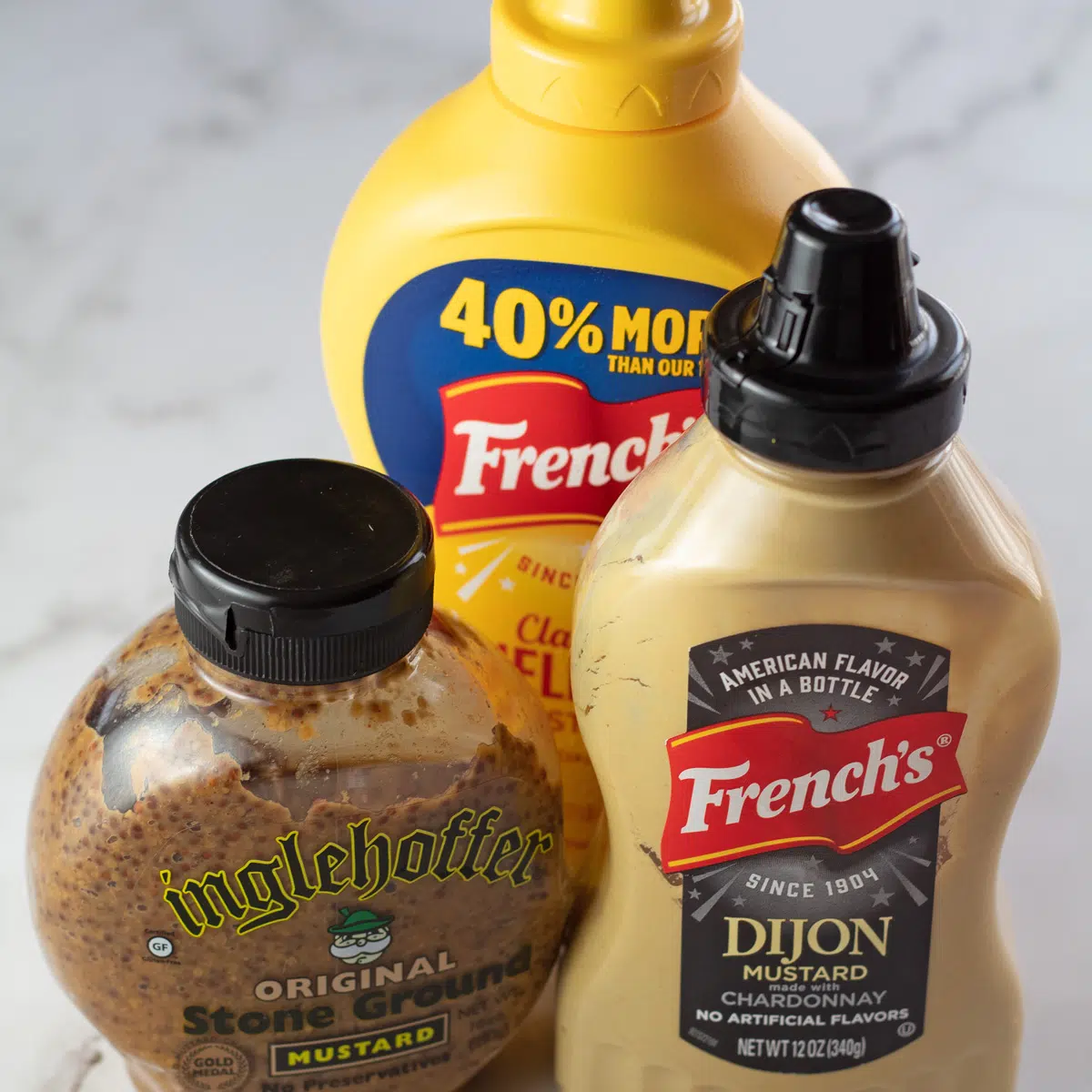
Jump to:
- Dijon Mustard vs. Mustard Differences
- What is Dijon mustard?
- Best Dijon Mustard Substitutes
- 1. Stone Ground Mustard
- 2. Yellow Mustard
- 3. Whole Grain Mustard
- 4. Hot English Mustard
- 5. Spicy Brown Mustard
- 6. Wasabi
- 7. Horseradish Sauce
- 8. Honey Mustard
- 9. Egg Yolks or Egg Yolk Powder
- 10. German Mustard
- 11. Beer Mustard
- 12. Mayonnaise
- 13. Worcestershire Sauce
- 14. Lecithin Powder
- ❓ Recipe FAQs
- 📖 Recipe Card
- 💬 Comments & Reviews
Have you run out of Dijon mustard in the middle of a recipe? Or did you find the bottle or jar empty when you have some amazing deli meat that's begging for some tasty, creamy Dijon??
No worries! There are several tasty alternatives to match any recipe you're making!
Or make this French mustard at home with my recipe below!
Dijon Mustard vs. Mustard Differences
Dijon mustard is a type of mustard that is unique in flavor and composition compared to yellow mustard. Yellow mustard is typically bright yellow and is made from white and yellow mustard seeds.
Dijon mustard is made with black mustard seeds, which makes it spicier than yellow mustard. It also has less vinegar, is creamier, and is a paler yellow color than yellow mustard.
What is Dijon mustard?
Dijon mustard is a French variety of mustard used as a condiment for sandwiches, sauces, glazes, dressings, seasoning, and more. It has a pale yellow color and is creamy and pasty in texture.
Don't worry about shaking Dijon mustard! There is less vinegar than your standard yellow mustard, so you won't get that watery liquid that is common with other types.
You will find it in a glass jar or plastic bottle. Once you open a Dijon mustard container, storing it refrigerated and using it within six months is best.
Dijon mustard is made with brown and black mustard seeds, which creates a kick of spice and is flavored with either white wine and vinegar or verjuice, a very acidic juice made from unripe grapes, crab apples, or another kind of sour fruit.
Many coarse mustards grind mustard seeds with two stones, like a mortar and pestle. They are called coarse mustards because many mustard seeds remain whole, leaving more texture and deep flavor.
Common coarse mustard varieties include creole, stone ground, whole-grain Dijon, and more.
Best Dijon Mustard Substitutes
The best Dijon mustard substitute is easily stone-ground mustard. It's so very similar to Dijon but with a milder flavor. The next best, simply due to the fact that it is pretty much a household staple everywhere, is yellow mustard. *See my FAQ to modify your yellow mustard as a Dijon substitution.
1. Stone Ground Mustard
Stone ground mustard is also made from brown mustard seeds, like Dijon. It has many whole mustard seeds and is, therefore, a milder flavor than Dijon.
With all the similarities, stone-ground mustard is a great substitution for Dijon mustard! Especially for dressings and marinades, in which the flavor profiles match seamlessly.
Use stone ground mustard in a 1:1 ratio to the amount of Dijon mustard called for in a recipe.
2. Yellow Mustard
Yellow mustard is sweeter, tarter, and more acidic than Dijon but is a staple household ingredient. It's affordable, too! You can use yellow mustard in place of Dijon with a 1:1 ratio.
3. Whole Grain Mustard
The flavor of whole-grain mustard is very close to Dijon mustard. The major difference is in texture, as the mustard seeds have not been crushed and are whole, resulting in a coarse mustard paste.
Use whole grain mustard instead of Dijon when cooking meats, making sandwiches, dressings, dips, and marinades, as long as you don't mind the texture difference.
4. Hot English Mustard
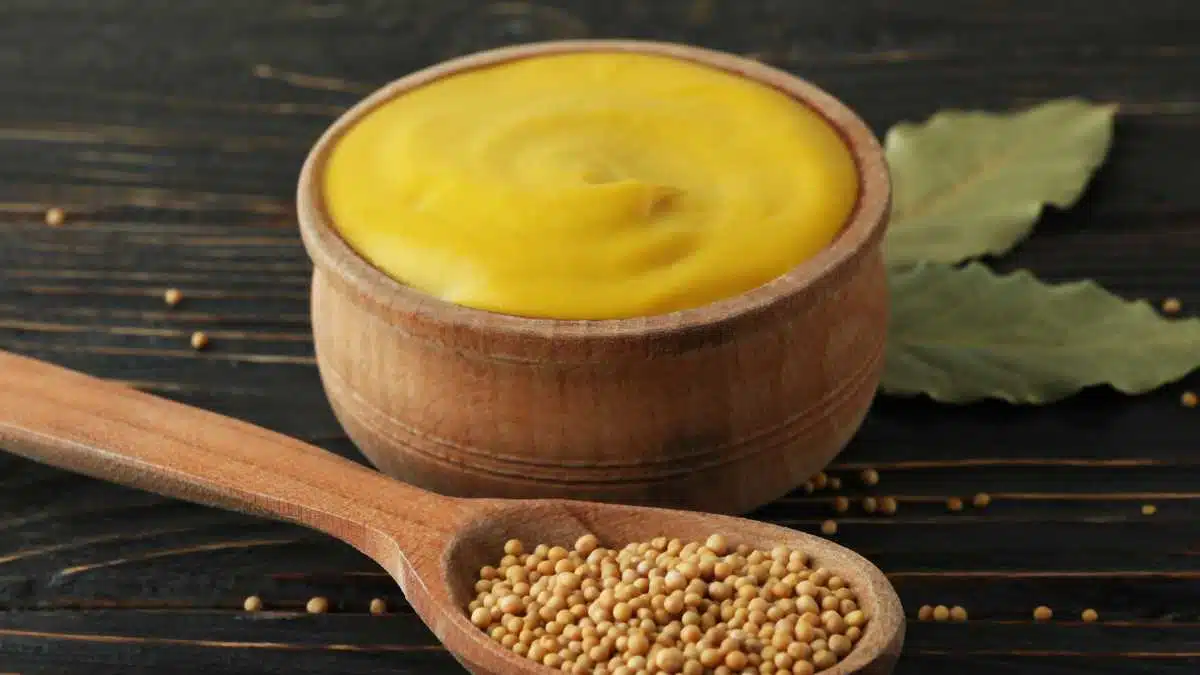
Hot English mustard is made from white, black, and brown mustard seeds and is a cross between Dijon and yellow mustard. I
It's spicy hot and goes well with meat roasts and sandwiches, and it is a great addition to sauces and gravies.
5. Spicy Brown Mustard
Spicy brown mustard has a more intense flavor and texture than Dijon but is a great alternative for making marinades, dressings, and topping bagels. Because of its zesty, bold flavor, use less than your original recipe calls for.
6. Wasabi
To substitute wasabi for Dijon, use less than a 1:1 ratio, as wasabi is known for its incredible spice. You can substitute it for Dijon when cooking meats and on sandwiches alike!
7. Horseradish Sauce
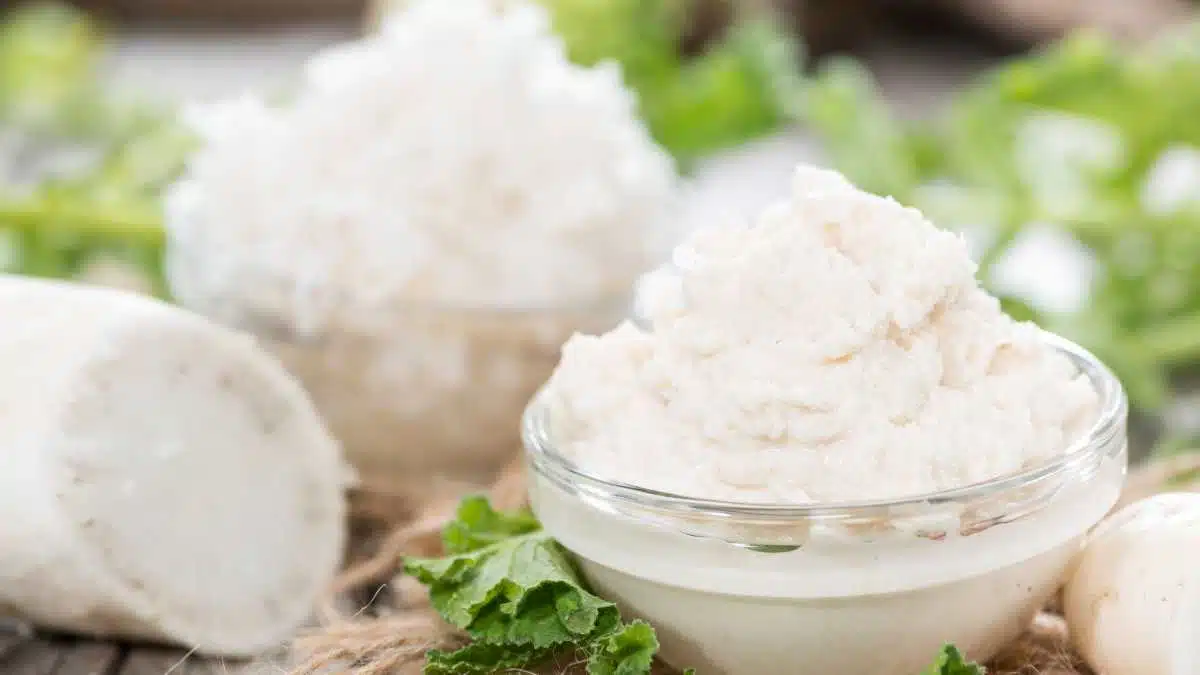
Horseradish sauce is very similar to Dijon mustard as it is creamy and tangy.
If you like horseradish, you can use horseradish sauce as a substitute and mix it with honey and cream, which will match the flavor even more.
This alternative is great for dishes that feature fish, beef, and lamb as a side sauce or dip.
8. Honey Mustard
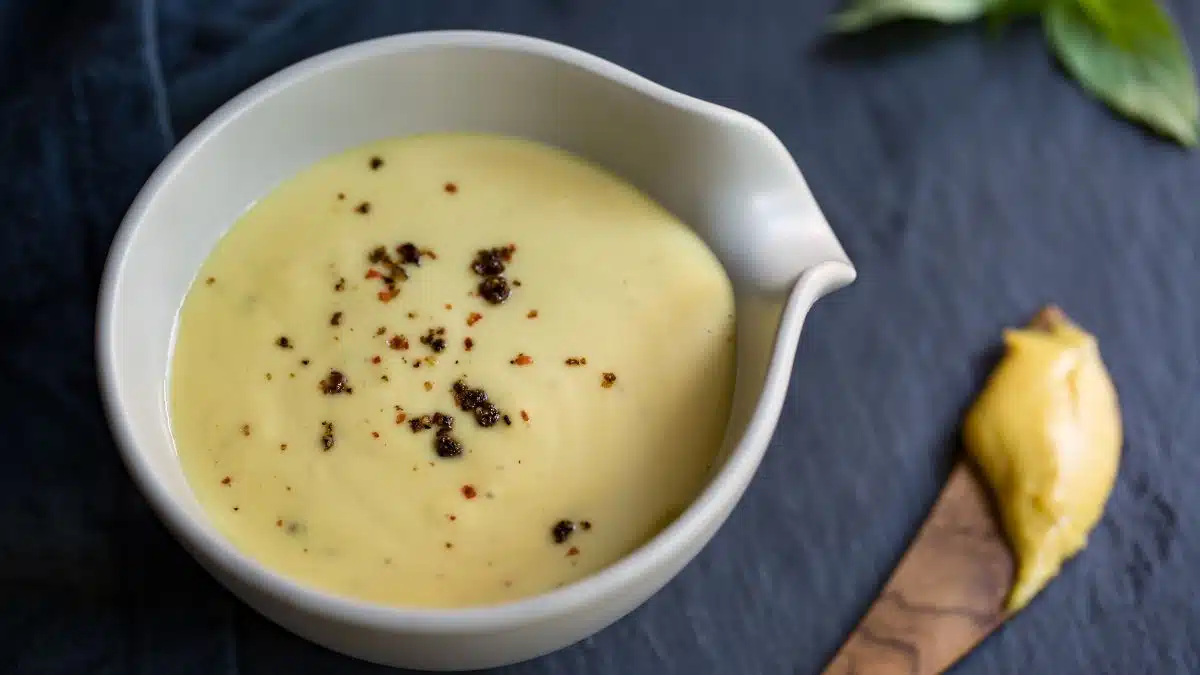
Honey mustard is noticeably sweeter than Dijon but pairs well with chicken and pork.
This makes it an excellent Dijon mustard alternative when paired with either protein!
Best used in dips, sauces, marinades, pork rubs, and dressings, with vegetables and salads.
9. Egg Yolks or Egg Yolk Powder
Egg yolks or egg yolk powder are good substitutes for Dijon when Dijon is used to thicken something.
Both egg yolks or egg yolk powder can be used in dressings to add a creamy thickness and keep the pale-yellow color that Dijon is known for.
To substitute, use a spoonful of egg yolk powder or a couple of fresh egg yolks in the recipe.
Consider adding some smashed garlic or fresh chopped herbs to deepen the flavor profile.
10. German Mustard
German mustard can be spicier than Dijon mustard and has many whole or partially crushed mustard seeds, giving it a lot of texture. It's made with brown mustard seeds, vinegar, and spices and is great paired with meats, sausages, wursts, hotdogs, and baked pretzels.
11. Beer Mustard
Beer mustard is actually made with an acidic beer instead of wine or verjuice. It has a deep flavor that is mild in spice. It's a good substitution for Dijon mustard as a dipping sauce, where its flavor won't be lost.
12. Mayonnaise
Mayonnaise is a versatile Dijon mustard substitute. It is creamy, sweet, tangy, and has some acidity from the vinegar. This is a good alternative for those who prefer a milder flavor than Dijon offers, as mayonnaise isn't complex in flavor.
You can use mayonnaise in just about anything - from a dip for French fries, salad dressings, marinades, meats, and burgers.
13. Worcestershire Sauce
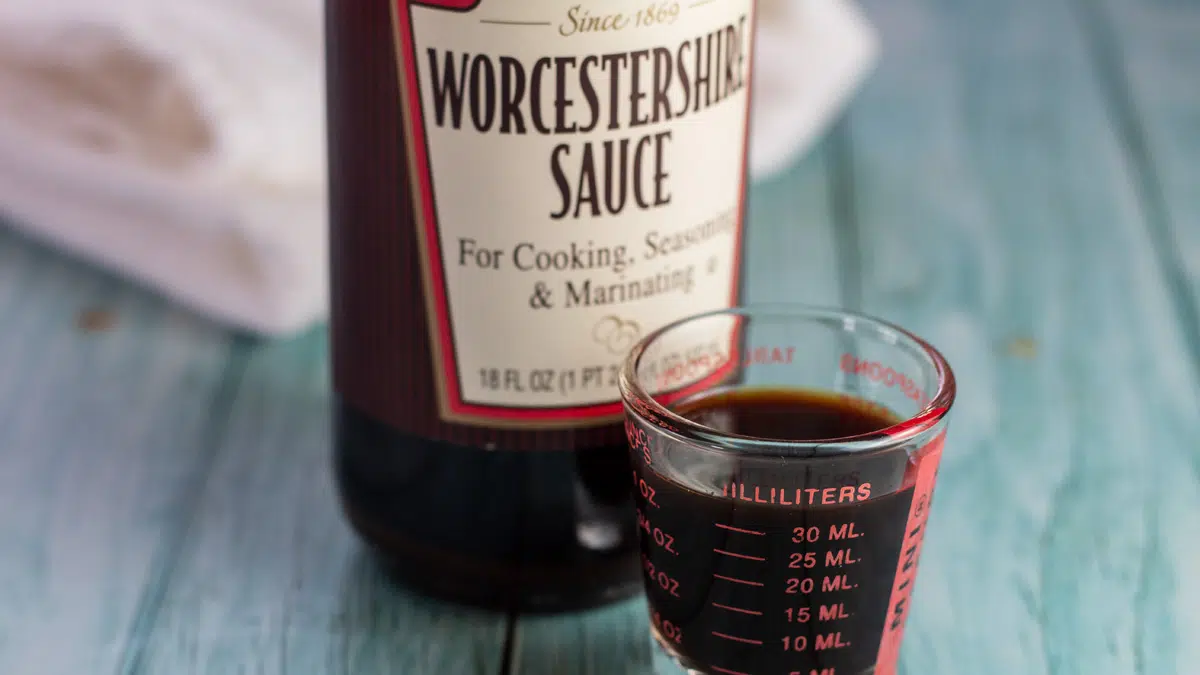
Worcestershire sauce is generally made from fermented molasses, vinegar, garlic, tamarind paste, anchovies, other condiments, onion, and sugar. It's tangy and bold in flavor and can mimic the taste of Dijon.
Since Worcestershire sauce has a higher liquid content, be mindful of how the extra liquid will affect the outcome of your dish. It's great for marinades and cooking meat, or can be mixed with mayonnaise or yogurt in dishes that aim for an ingredient that's creamy.
14. Lecithin Powder
Lecithin powder isn't necessarily a common pantry staple but is a great vegan alternative when thickening a Dijon substitute, especially for salad dressings and sauces. Because lecithin powder doesn't add much flavor, be sure to grab your favorite spices to boost its flavor.
Don't forget to check out all of my other great substitutes when you find yourself short of an ingredient!
❓ Recipe FAQs
Both Dijon and stone-ground mustard are made from the same type of brown mustard seeds, but many of the seeds in stone-ground mustard are left whole during the mortar-and-pestle-like grinding process, which results in a milder spice mustard. The seeds in Dijon mustard are completely crushed, which yields a bolder flavor.
Dijon mustard and regular, yellow, "American" mustard are quite different, so you can't truly make Dijon mustard out of regular mustard. Read below for what you can add to yellow mustard to make it more like Dijon.
You can't make Dijon mustard from yellow mustard because it is made from different ingredients. If you only have regular yellow mustard on hand and need or want Dijon mustard, try adding a little mayonnaise to the yellow mustard. This will mimic the creaminess of Dijon, especially for cooking.
Whole grain Dijon mustard, or country Dijon, is Dijon mustard made in the traditional French method but also has whole grain mustard seeds. You can use regular Dijon mustard if you don't have whole-grain Dijon mustard. It will offer a similar flavor without the texture.
Do you love a recipe you tried? Please leave a 5-star 🌟rating in the recipe card below and/or a review in the comments section further down the page.
Stay in touch with me through social media @ Pinterest, Facebook, Instagram, or Twitter! Subscribe to the newsletter today (no spam, I promise)! Don't forget to tag me when you try one of my recipes!
📖 Recipe Card
Homemade Dijon Mustard
Ingredients
- ¾ cup white wine (use a dry white wine that is not a sweet variety)
- ½ cup water (use more if needed)
- ⅓ cup white wine vinegar (or distilled white vinegar)
- 1 cup shallots (chopped - or use yellow or white onion)
- 1 clove garlic (minced, or 1 teaspoon)
- ½ cup whole yellow mustard seeds
- 2 tablespoon dry mustard
- ½ tablespoon garlic powder
- ½ teaspoon salt (to taste)
(Note: 2x or 3x only changes the ingredient list)
Instructions
- Add the ¾ cup white wine, ½ cup water, ⅓ cup white wine vinegar, 1 cup shallots (or onions), and 1 clove garlic to a saucepan. Bring them to a boil over medium-high heat, then reduce the heat and simmer for 15 minutes. Remove from heat and allow to cool to room temperature.
- Strain the cooled mixture through a fine mesh sieve into a medium bowl, then discard the onions and garlic. Add the ½ cup whole yellow mustard seeds, 2 tablespoon dry mustard, ½ tablespoon garlic powder, and ½ teaspoon salt into the white wine base. Stir then cover the bowl with plastic cling film wrap and leave the mixture out at room temperature for 1-2 days. The mixture will thicken as it sits out.
- Blend the thickened mixture using a blender, immersion blender, or food processor until it reaches your desired consistency (smooth or coarse).
- Transfer the mustard to a saucepan, add water (as needed) until your mustard is thinned out a bit, and cook over medium-high heat until the sauce begins to bubble. Reduce heat to medium or medium-low and simmer, stirring constantly. Simmer for 8-10 minutes to let the flavors combine, then remove from heat and allow to cool completely before storing.
- Store your Dijon in airtight containers (hot, sterilized glass jars are best). Leave ¼-inch space between the top of the mustard and the lid. Gently tamp the jars down to remove any bubbles. Store in the refrigerator for at least 1 week before using.


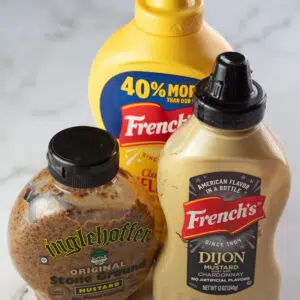
Angélica says
Amei Todo conteúdo,muito Bem ecplicado.
"I loved all the content, very well explained."
Karhu says
I can taste even the smallest amount of mustard or parmessn cheese in any recipe so I understand your husband. No one needs to mention the ingredients.
I was told it's a genetic thing with taste. Same goes for sharp cheeses. Yes, I have tried all many, many times.Funny buy I love Wasabi so will try that.